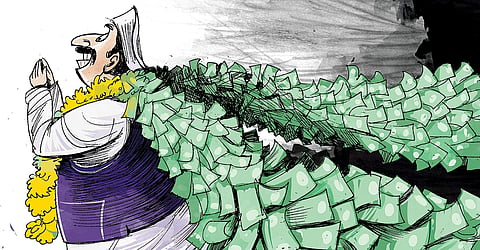

A cofferdam is a diversionary structure meant to redirect the waters of a river while the main dam is being built on the original channel. The current talk about public funding of elections as another measure to eradicate black money is meant to do precisely that— deflect the public’s demand for a clean-up of the electoral system.
It is a red herring which will further fatten the political parties, this time at the expense of the taxpayer. State funding of elections and political parties is part of an international “clean election” programme. Seventy-one out of 180 countries have it in one form or the other, but experience across nations has shown it does not work. A 2003 federal study in the US (where roughly half the states practise it) found it ineffective; experience in Italy, Spain, Australia and Israel also showed it neither restricted the sources of funding nor reduced election expenditure—the two main objectives.
State funding essentially means the state shall provide funds to political parties to contest elections, and in return, there are restrictions on their accepting funds from public sources. For a country of India’s size, the financial implication is huge. In a 2013 article, former Chief Election Commissioner S Y Quraishi estimated that a cycle of Parliament and state elections will cost the exchequer as much as `10,000 crore, roughly equal to what the political parties themselves raise (as per their declarations, which in any case are suspect).
This issue has been examined earlier by many committees: the Tarkunde Committee, the Indrajit Gupta Committee (1998), the Committee on Constitutional Reforms and the Law Commission (2015). Interestingly, none of them have unequivocally supported introduction of state funding. Nor has Quraishi. They are all of the view that India lacks the legal, financial and social ecology for such an instrument, and recommend we should continue with the present system of indirect support such as free office space, unpaid time on the national broadcaster, publication of electoral rolls at state expense etc.
There really is no need for any further study of the subject, at least for now. There are valid conceptual and economic arguments against introducing state funding in our country. Take the former first: why should a taxpayer be forced to contribute to political parties he does not support? The question acquires even more relevance now that NOTA is an option available to a voter. Second, is it legitimate and morally sound to give scarce resources to a miniscule class who practise the profession of politics, while denying it to other professions? Thirdly, it has even been argued that it is antidemocratic as, by favouring the established political parties, it protects the status quo and acts as an entry barrier for new parties. (The Indrajit Gupta Committee had recommended that funding be denied to independents).
The economic arguments against state funding are stronger. The main objection is—in a resource-starved country where 300 million live below the poverty line and where the average per capita income is $1 a day, is it equitable to give such humongous sums of money to an elite class? Limited resources should be utilised for the welfare of the largest number.
The justification for and the appropriateness of state funding depend on the economic conditions in a country and India is certainly not in a position where it can afford this luxury. The experience of other, more developed countries with more effective legal systems has demonstrated that state funding neither prevents parties from raising funds from corporates, nor does it reduce election expenditure. It actually makes elections more expensive because parties pocket government funds and continue to raise private funding clandestinely (further disadvantaging the relatively newer or more honest candidates)!
This actually cuts to the heart of the problem, especially in a fiscally chaotic nation like ours with an untaxed, parallel economy the size of the legal economy (whether demonetisation can eradicate it remains to be seen, and state funding should not be postulated on the presumption that it will do so). The success of state funding depends on a strong regulatory framework, stringent punishments, a quick and effective judicial system, an alert and demanding electorate, a broad consensus on political ethics—all of which we woefully lack. How can the idea work in a polity where we are unable to compel parties to declare the sources of their donations, or ensure they adhere to prescribed expenditure limits, or warrant that election petitions will be decided before the next elections?
State funding is an exotic plant and cannot bear fruit in our imperfect conditions. By talking about state funding, the political parties are shrewdly steering the narrative away from what actually needs to be done—bringing them under the ambit of the Right to Information Act; amending the Representation of People Act to make them account for all donations, irrespective of their form, amount or source; setting up of special courts to decide election petitions within a year; debarring all candidates against whom criminal charges have been framed in a court of law (currently they have to be convicted for this provision to operate).
It is these changes that will cleanse the Augean stables of Indian politics, not the throwing of good (or white) money after bad (or black), which is what state funding will amount to. Let us not waste our resources and energy on building a cofferdam; let us start work on the main dam itself.